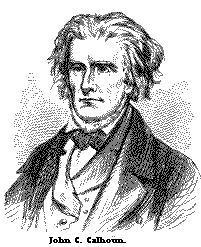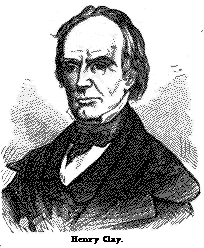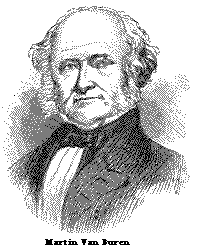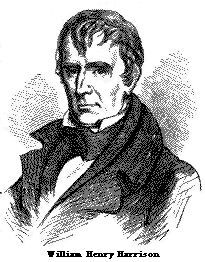Resource Center OLLibrary
|
198 |
|
senator from Massachusetts, and Robert Y. Hayne, from South
Carolina, were the leading disputants. The latter maintained the
state-rights doctrine, -- that is, the right of a state to
determine for itself how far it would yield obedience to the laws
of the United States. The former, in a masterly oration,
established as far as argument could, the sovereignty of the
 general
government, and that the Supreme Court was the proper tribunal to
decide cases of conflict between the state and
nation.
general
government, and that the Supreme Court was the proper tribunal to
decide cases of conflict between the state and
nation.
9. Late in 1832, South Carolina,
asserting the principle of a protective tariff to be unjust
![]() and
unconstitutional, issued an ordinance of
nullification,1 declaring the tariff laws2
null and void, and prepared to resist the enforcement of
them in that state. Civil war was imminent; but that calamity was
averted by the promptitude and decision of the president, and by a
compromise tariff passed by Congress.
and
unconstitutional, issued an ordinance of
nullification,1 declaring the tariff laws2
null and void, and prepared to resist the enforcement of
them in that state. Civil war was imminent; but that calamity was
averted by the promptitude and decision of the president, and by a
compromise tariff passed by Congress.
The tariff of 1828 was the subject
of loud and bitter complaint; and though it was modified, with a
view of making it more acceptable to its opponents, yet, as it
still adhered to the principle of protection, it failed to satisfy
them. The strongest opposition was in Virginia, Georgia, and South
Carolina. The last alone, in 1832, went to the length of
nullification, -- that is, of annulling an act of Congress, --
threatened secession,3 and prepared to resist the
authority of the federal government. Calhoun resigned the
vice-presidency,4 to advocate, on the floor of the
Senate, the policy of South Carolina, of which he was, in fact,
the author.
Jackson, with characteristic energy and
firmness, proclaimed his deterInitiation to enforce the laws of
the United States, and sent General Scott to Charleston, to
maintain the national authority. The unflinching
1 This nullifying ordinance was passed by a state convention, November 24 , 1832, and was to take effect February 1, 1833; but just before that day it was resolved, at a meeting at Charleston, of the leading nullifiers, to postpone action. 2 See p. 194, ¶ 3.
3 The ordiniance declared that if the government of the United States should attempt to enforce he tariff laws by its army or navy, South Carolina would no longer consider herself a member of the Federal Union. 4 See p.194, ¶ 5. and p. 193, ¶ 9.
QUESTIONS. -- What is said of the discussion by Webster and Hayne? 9. What course did South Carolina take in regard to the tariff? What did the ordinance of nullification declare? How was civil war averted? On what ground was the tariff objected to? In what states was the strongest opposition? To what length did South Carolina go? What is said of Calhoun? What course did Jackson take? Effect?
|
|
199 |
 attitude
of the executive made the state pause. Out of South Carolina
party strife was postponed. All united to support the president,
and that state, taking advantage of a tariff compromise,
passed by Congress, receded from her defiant position. This
compromise, the work of Henry Clay,1 provided for a
gradual reduction of duties on imports till 1843, when should
exceed twenty per cent.
attitude
of the executive made the state pause. Out of South Carolina
party strife was postponed. All united to support the president,
and that state, taking advantage of a tariff compromise,
passed by Congress, receded from her defiant position. This
compromise, the work of Henry Clay,1 provided for a
gradual reduction of duties on imports till 1843, when should
exceed twenty per cent.
10. Jackson's financial policy
constituted a prominent feature of this administration. In
![]() 1832, he
vetoed a bill passed by Congress to renew the charter of the
United States Bank,2 and the bank ceased to be a
national institution when the charter expired.
1832, he
vetoed a bill passed by Congress to renew the charter of the
United States Bank,2 and the bank ceased to be a
national institution when the charter expired.
11. The election in the autumn made
Jackson president for another term, by a greatly increased
majority. Martin Van Buren, of New York, was elected
vice-president. Thus supported in his policy by the people,
and believing the public moneys no longer safe in the ![]() keeping
of the United States Bank, Jackson proceeded to sever the
connection between the government and that institution; and by his
order, in 1833, the secretary of the treasury transferred the
national deposits2 to certain state banks.
keeping
of the United States Bank, Jackson proceeded to sever the
connection between the government and that institution; and by his
order, in 1833, the secretary of the treasury transferred the
national deposits2 to certain state banks.
The federal House of representatives
supported the president in his war upon the bank; but the Senate
passed a resolution censuring his course, which resolution was
expunged from the journal of the Senate a few years after, through
the exertions of Thomas H. Benton, of
Missouri.
12. The removal of the deposits made it
necessary for the bank to contract its loans. Money became scarce.
Debtors throughout the country were unable to meet their
liabilities, and the result was great commercial
distress.
1 See p. 188, note 5, and p. 171, ¶ 2. 2 See p. 189, ¶ 2.
QUESTIONS. -- What is said of a compromise tariff? 10. What is said of Jackson's financial policy? What bill did he veto in 1832? II. Result of the election that autumn? What further steps did Jackson take against the United States Bank, and for what reason? -- How was the President's course regarded by the two Houses of Congress? 12. How did the removal of the deposits cause great commercial distress?
|
200 |
|
This, to his friends,
seemed but to prove the wisdom of Jackson's policy in curbing the
career of an institution which held such power over the moneyed
interests of the country, and which, they maintained, by an
unnecessarily sudden contraction of the currency, had caused this
distress in order to make the people dissatisfied with the
administration.
13. Soon the state banks holding the
public funds were enabled largely to increase their loans. The
country was flooded with paper money. Business revived from its
late depression, and there was, in appearance, the greatest
prosperity; but it was in appearance only. Thousands plunged
wildly into over-trade and speculation, on capital borrowed
without regard to the ![]() means
of payment. But two measures, in the latter part of Jackson's
presidency, cut short their career. One of these was the specie
circular, issued by order of the president, requiring payment
for public lands to be made in gold and silver; and the other was
an act of Congress, ordering the surplus revenue, excepting
a reserve of five millions of dollars, to be withdrawn from the
banks and distributed among the States.1 Again there
was a great contraction of bank circulation, and unparalleled
commercial distress was left as a legacy to the next
administration.2
means
of payment. But two measures, in the latter part of Jackson's
presidency, cut short their career. One of these was the specie
circular, issued by order of the president, requiring payment
for public lands to be made in gold and silver; and the other was
an act of Congress, ordering the surplus revenue, excepting
a reserve of five millions of dollars, to be withdrawn from the
banks and distributed among the States.1 Again there
was a great contraction of bank circulation, and unparalleled
commercial distress was left as a legacy to the next
administration.2
14. On the night of December 16,
1835, a destructive conflagration occurred in the city of
New York, which swept through the business part of the
city, destroying more than six hundred of the most valuable
stores, and property to the amount of eighteen millions of
dollars.
![]() 15.
The original number of states was doubled during Jackson's term of
office, by the admission of Arkansas3 in 1836,
and Michigan4 the next year.
15.
The original number of states was doubled during Jackson's term of
office, by the admission of Arkansas3 in 1836,
and Michigan4 the next year.
![]() Arkansas
was part of Missouri Territory, but in 1819 was set off as a
distinct territory, including, besides the present state, a part
of what is now the Indian Territory. It was first settled at
Arkansas Post, by the French, in 1685. Michigan,
first a part of the North-west Territory,5 then of
Arkansas
was part of Missouri Territory, but in 1819 was set off as a
distinct territory, including, besides the present state, a part
of what is now the Indian Territory. It was first settled at
Arkansas Post, by the French, in 1685. Michigan,
first a part of the North-west Territory,5 then of
![]() Indiana
Territory,6 was organized as a separate territory in
1805, with limits much more extended than those of the present
state.7 Detroit, its oldest permanent European
settlement, was founded by the French in 1701.
Indiana
Territory,6 was organized as a separate territory in
1805, with limits much more extended than those of the present
state.7 Detroit, its oldest permanent European
settlement, was founded by the French in 1701.
1 The amount actually divided among the states was over twenty-eight millions of dollars.
2 See p. 201, ¶ 1. 3 The state takes its name from a now extinct tribe of Indians.
4 The name Michigan is supposed to be derived from two Indian words signifying great lake.
5 See p. 151, ¶ 2. 6 See p. 189, ¶ 4. 7 See p. 206, ¶ 13, and p. 218, ¶ 3.
QUESTIONS. -- What did this seem to prove to Jackson's friends? 13. What were the state banks soon enabled to do? Result? What is said of over-trade and speculation? What two measures are mentioned, and their result? 14. What is said of the conflagration in New York in 1835? 15. When were Arkansas and Michigan admitted to the Union.? -- What can you tell of the early history of Arkansas? Of Michigan?
|
|
201 |
16. Party spirit,
which we have seen springing up during the, presidency of John
Quincy Adams, assumed definite form under Jackson. Those who
supported the administration, and opposed the United States Bank
and a tariff for protection, were called Democrats. Those
who opposed the administration, and advocated a bank and
protective duties, were, after some changes of name, called
Whigs.
At the next election, the democrats made their
candidate, Martin Van Buren, of New York, president.
Richard M. Johnson,1 of Kentucky, was chosen
vice-president by the Senate, no choice having been
effected by the people.2
CHAPTER VIII.
VAN BUREN'S ADMINISTRATION.3 1837-1841.
 1.
SCARCELY had Mr. Van Buren succeeded to the
presidency, when the financial storm,4 which we
have seen gathering, burst upon the country with great
violence.
1.
SCARCELY had Mr. Van Buren succeeded to the
presidency, when the financial storm,4 which we
have seen gathering, burst upon the country with great
violence.
During March and April, the
failures in the city of New York alone were estimated at
more than one hundred millions of dollars. Confidence and credit
were destroyed. Not a few who retired at night in affluence awoke
in the morning penniless. The banks suspended specie
payment. The government found it impossible to call in its
deposits, or collect its dues in specie. The national treasury,
recently full to overflowing, was exhausted. Many of the
states had vied with individuals in extravagant expenditure.
Eight of them,5 either wholly or in part, failed to
meet their engagements. Mississippi and the Territory of Florida
repudiated their debts.
1 See p. 178, ¶ 13. 2 See Appendix, p. 16, Art. XII., Amendments Const. U. S.
3 See Appendix p. 211. 4 See pp. 199, 200, ¶¶ 12,13.
5 Arkansas, Illinois, Indiana, Louisiana, Maryland, Michigan, Mississippi, and Pennsylvania.
QUESTIONS. -- What is said of party spirit? Who were called democrats? Who shigs? -- Who succeeded to the presidency, and who to the vice-presidency? Chap. VIII. I. What storm in the early part of Van Buren's presidency? -- What is said of failures and their results? Of bank suspensions and the result? Of many of the states?
|
202 |
|
2. The great financial
measure of this administration was an act establishing the
![]() independent
treasury.1 This provided that the public funds
should be kept, subject to the order of the secretary of the
treasury, in the treasury at Washington, and in sub-treasuries
located in some of the principal cities of the nation, under the
care of federal officers called assistant treasurers.
independent
treasury.1 This provided that the public funds
should be kept, subject to the order of the secretary of the
treasury, in the treasury at Washington, and in sub-treasuries
located in some of the principal cities of the nation, under the
care of federal officers called assistant treasurers.
This measure, though urged upon Congress
by the president in his first message, failed to become a law till
1840. It was argued that, by thus keeping the public funds
independent of the banks, the government would escape a
repetition of losses such as it had recently suffered by their
failure.
3. A rebellion in Canada,
against the government of Great Britain, broke out in 1837, and
enlisting the sympathies of many of the Americans, threatened to
disturb the peaceful relations between England and the United
States. The danger was averted by a proclamation of the president
refusing the protection of the government to citizens of the
United States who should aid the insurgents, and by the efforts of
General Scott, who was sent to the frontier to preserve
neutrality.2
4. The
north-eastern boundary of the United States had never been
definitely settled. Disputes had arisen in regard to it, and the
inhabitants of Maine and New Brunswick determined to appeal to
arms, to uphold their respective territorial claims. In this state
of affairs, General Scott was sent to the scene of strife, and his
wise and conciliatory course preserved the public peace. The
question was settled, in 1842,3 by a treaty negotiated
by Daniel Webster on the part of the United States, and Lord
Ashburton on the part of Great Britain, establishing the boundary
as it now runs. This treaty also provided for the suppression of
the African slave trade.
At the election in 1840, after a
most exciting campaign, William Henry Harrison,4 of
Ohio, the candidate of the Whigs, was elected president,
and John Tyler, of Virginia, vice-president.
1 This act was repealed in 1841, during Tyler's administration, but the independent treasury was again established in 1846, during Polk's administration.
2 A party of Americans and Canadians, supplied with provisions and cannon, took possession of Navy Island, in Niagara River, and belonging to Canada. The insurgents hired a steamboat, called the Caroline, to transport men and munitions of war from the American shore to the island. On the night of the 29th of December, a detachment of British cut this steamboat from her fastenings at Schlosser, set her on fire, and let her drift over the falls. One American was killed, and others were reported to have been lost in the boat. This added greatly to the excitement in the United States, and rendered it more difficult to prevent the Americans from aiding the Canadians in their insurrection.
3 In Tyler's administration. 4 See p. 169, ¶ 1, and p. 179,¶ 14.
QUESTIONS. -- 2. What was the great financial measure of this administration? What did this provide? -- What further is said of this measure? 3. What rebellion broke out in Canada, and when? How did this affect the United States? How was the danger averted? 4. Give an account of the difficulty with respect to the north-eastern boundary. When and how was the question settled? For what else did this treaty provide? -- Who were elected president and vice-president to 1840?
|
|
203 |
CHAPTER IX.
HARRISON'S AND TYLER'S ADMINISTRATIONS.1 1841-1845.
 1.
Soon after the accession of Harrison, he issued a call for
an extra session of Congress, to consider "matters connected with
the finances of the country;" but he did not live to see it
assemble. He died just one month after his induction into office,
and, by the constitution,2 the vice-president, John
Tyler, became president, April 6,1841.
1.
Soon after the accession of Harrison, he issued a call for
an extra session of Congress, to consider "matters connected with
the finances of the country;" but he did not live to see it
assemble. He died just one month after his induction into office,
and, by the constitution,2 the vice-president, John
Tyler, became president, April 6,1841.
2. The extra session of Congress,
called by President Harrison, commenced May 31. The great object
of the session was the establishment of a national bank
.3 Two bills, passed for this purpose, were vetoed by
President Tyler, greatly to the chagrin of the party that elected
him, and to the disgust of his cabinet, every member of which
resigned except Mr. Webster,4 secretary of state, who
felt that public interests demanded that he should for a time
remain at his post. A general bankrupt law was enacted this
session, for the relief of those whom the late financial
convulsions had hopelessly embarrassed.5
3. In 1842 an exploring
expedition, fitted out by the government four years before,
under Lieutenant Charles Wilkes,6 returned from a
cruise, chiefly in the Pacific and Antarctic Oceans, of about
ninety thousand miles, more than two thousand of which had been
along the coast of the hitherto unknown Antarctic
continent.7
1 See Appendix p 21. 2 See Appendix, p. 12, ¶ 6, Sec. 1, Art. II., Const. U. S.
3 See p. 201, ¶ 16. 4 See p. 202, ¶ 4, p. 181, ¶ 24, and p. 197, ¶ 8.
5 This law was repealed before the close of Tyler's term of office when the necessity for it had passed away. 6 See p. 286, ¶ 78.
7 Several volumes containing the history of the expedition, with its observations and researches, have been published at the national expense.
QUESTIONS. -- 1. For what purpose did Harrison call an extra session of Congress? When did Harrison die? Who succeeded to the presidency? 2. What was the great object of the extra session of Congress? What bills did Tyler veto? What is said of his party and his cabinet? What is said of general bankrupt law? 3. What can you tell of the exploring expedition under Lieutenant Wilkes?
|
|
|
|
|
|
© 1999, 2000, 2001 for NEGenWeb Project by Ted & Carole Miller